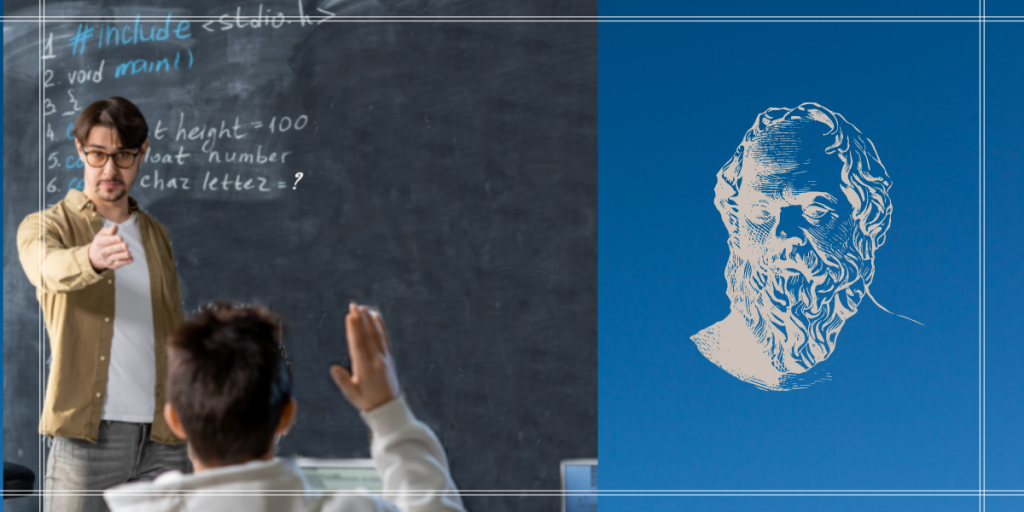
Socrates, an ancient Greek philosopher, was one of the brightest philosopher and teacher the world has ever seen. He authored no texts and is known mainly through the posthumous accounts of his equally luminous students Plato and Xenophon. These accounts are written as ‘dialogues’ in which Socrates and his interlocutors examine a subject in the style of question and answer, usually with Socrates taking the lead, and gave rise to the ‘Socratic dialogue’ literary genre. The key learning from these ‘dialogues’ is that Socrates always valued logical, reasoned oral arguments – dialogues – that sought truth through probing discourse.
The Socratic way of teaching-learning process can be summarised as one in which an engaged, passionate teacher facilitates a critical dialogue and acts as a kind of intellectual coach. Constantly probing, asking critical questions, pushing the learner to dive deep into her/his mind to search for rationale, reason. Not a teacher merely lecturing or teaching to a test. The Socratic method trains one to ask questions like: What’s going on here? What does this possibly mean? What’s important? What’s less important? What might be motivating this person to say this?
The significance of Socratic way in today’s world
Socratic way of teaching is timeless. It transcends all boundaries of time, geographies and subjects. It is as relevant and significant today as it was in the 5th century B.C. It is one thing to write a good, well-structured essay or be able to apply your skill/knowledge/memory to crack a test, but later in life, you will have to be able to mentally construct your thoughts, ideas, views and articulate them effectively. You need that ability to critically think through an issue and be able to hold multiple contrasting views in your head. Be able to appreciate, analyse, synthesise varied views and come up with your own unique perspective on the given issue.
As time evolved, so did the method. Today, the Socratic Method is used to teach students mainly from the medical and law background. Using the Socratic method, teachers can devise numerous ways to question their students. However, the styles of their line of query could be poles apart. For example, at one end of the spectrum, a teacher might pick a random student in the class, and ask her/him rapid-fire questions during the entire class duration. The purpose of this is to create loopholes in the argument. While on the other end, a professor at a law university might use this method to discuss with group of students some legal principles. The approach could be more collaborative than the one of intimidation as mentioned above.
Read-More: 7 Ways to Increase Productivity While Studying
The modern way of Socratic teaching
The historical version differs from the one used today. The modern practice of this methodology doesn’t completely depend on the answers given by the learners. Rather a series of questions are set to lead the learners to the basic idea. By drafting the question in this way, the learners tend to get more engaged and curious about the discussion. The questions that can be easily understood and appreciated by learners, enable them to immerse themselves in the topic and the discussion – rather the dialogue as Socrates would have liked to call it.
Why use the Socratic method?
There are three prime reasons that Socratic learning is followed by teachers even today, after 2500 years later.
- It enhances critical thinking – an important 21st century skill
- It pushes learners to think quickly on their feet
- It drives learners to be more attentive and prepared
The method encourages students to discover weak links on any subject or argument. Once they get an understating of what is lacking in that topic, they can create strategies to make the argument robust and strong, thus calling-in their HOTS (Higher Order Thinking Skills). This method is especially famous in law colleges as it prepares the student for the judge’s or their opponent’s rapid-fire questions. Being forced to always pay attention and stay prepared, help them to hone their active listening skill.
To sum it up…
The core philosophy of Socrates was “there is almost never one correct answer or explanation to any issue”. This would apply to the ideal teaching-learning process as well. There can’t be one right methodology that would work for everybody or all student groups. Socratic way is just one way of exploring knowledge, nurturing curiosity, boosting innovation… But one should not forget that there are numerous other pedagogical approaches which are equally beneficial and effective, ultimately leading to the core objective of imparting knowledge and skills to the learner. Finally, we must not forget that the learning should never be just about gaining information but its primary goal should be to learn how to learn.







